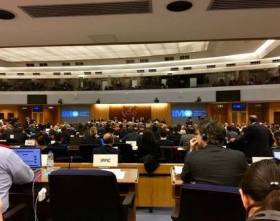Displaying items by tag: Cleaning Systems (Scrubbers)
#ports&shipping - The International Maritime Organization (IMO) Marine Environment Protection Committee (MEPC 74) is to commence this week in London, a discussion on an EU proposal on exhaust gas cleaning systems (scrubbers).
The proposal, which has been submitted by the EU 28 Member States and the European Commission, aims to start the discussion at international level on the discharges from scrubbers into the water, especially in sensitive areas such as ports.
To protect the water quality and to respect the EU standards imposed by the Water Framework Directive, some EU Member States have taken initiatives to limit liquid discharges from scrubbers in port areas.
“Water quality is a great priority for European ports being continuously in the annual Top 10 of European ports’ environmental priorities. The scrubber discharges into the water is currently triggering different approaches and measures in the EU Member States. It is important to start the discussion at international level on the possible impact of these discharges as soon as possible in an open and transparent way, using the evidence available. This must lead to a more coordinated global approach to the issue, if possible. With the upcoming IMO 2020 sulphur cap, the issue is becoming a priority,” says European Sea Ports Organisation Secretary General, Isabelle Ryckbost.
























































